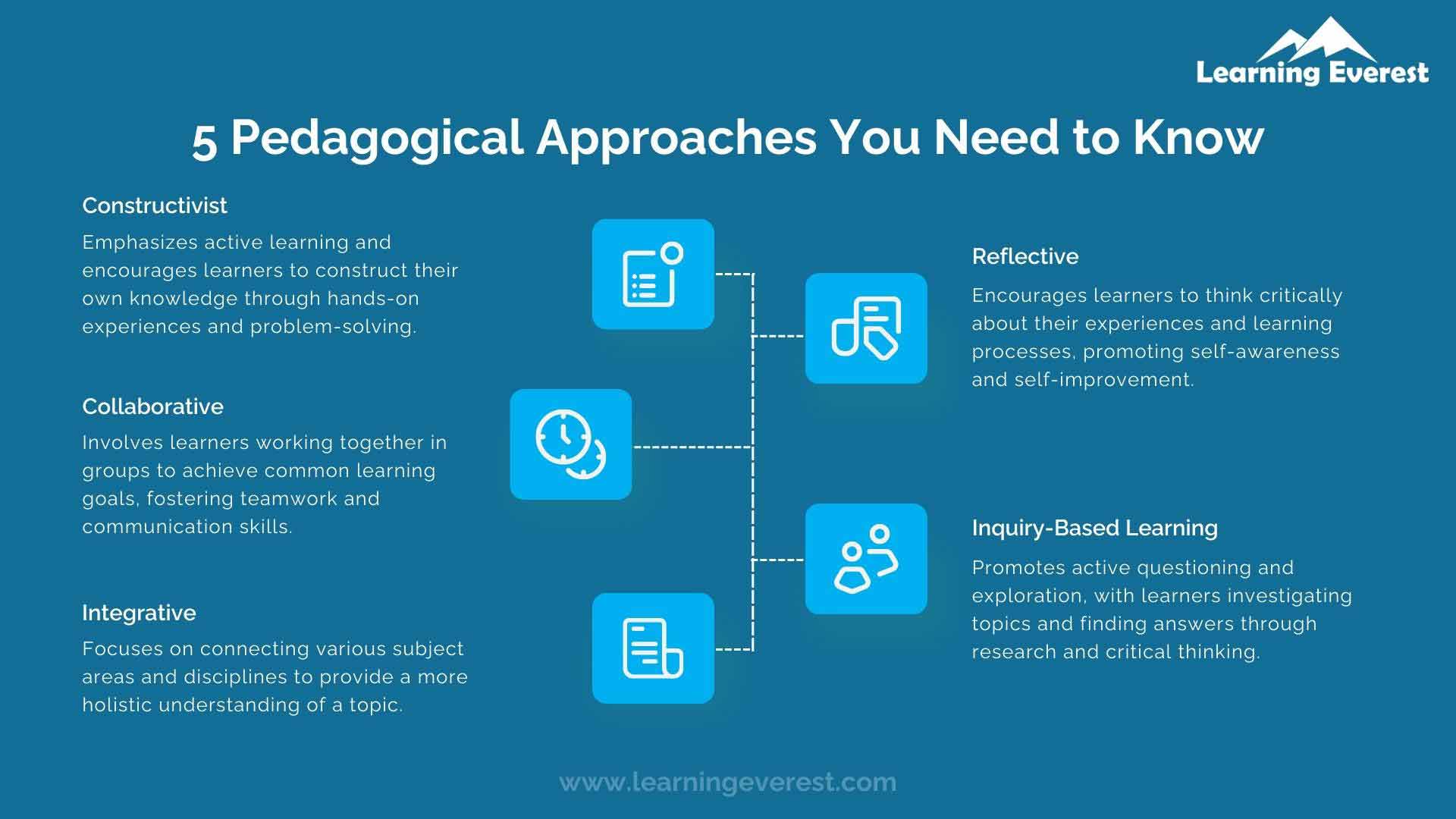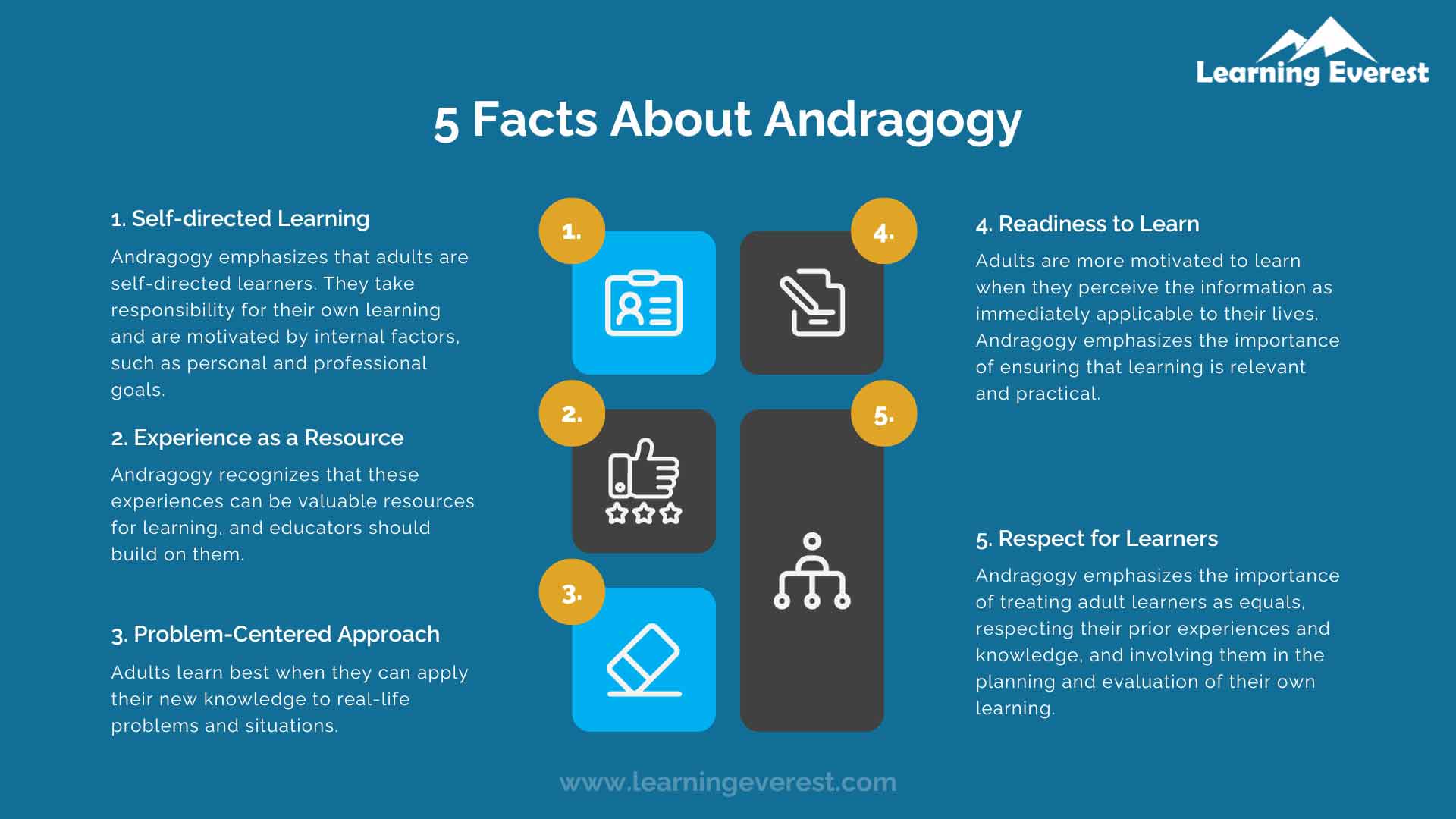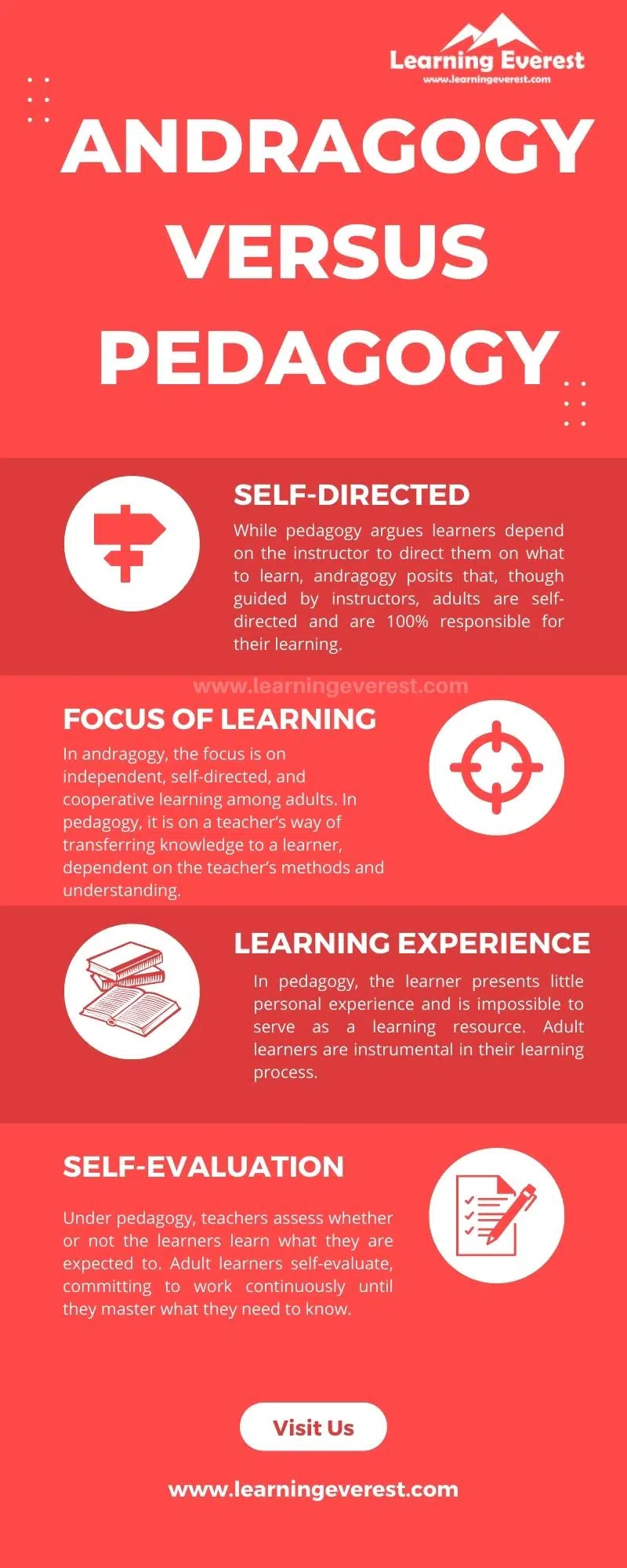Andragogy vs Pedagogy - Andragogy and Pedagogy are a practice of learning. Both are used in the teaching-learning process. Before 1950, learning methods were centered only around the way children operated. After all, traditional schooling was pretty much how and where education took place. Finally, adult educator and researcher Malcolm Knowles in 1950 adopted the term “andragogy” to refer to adult learning. According to him, while children required more extrinsic motivation and relied on instructor-led methods, Knowles noticed that adults were self-directed and relied heavily on their past experiences when they approached learning opportunities.
Table of Contents
- What is Pedagogy?
- What is Andragogy?
- Andragogy vs Pedagogy – Key differences
- Infographics – Andragogy vs Pedagogy
- Conclusion
- Frequently Asked Questions (FAQs)
- What is the Andragogical approach to teaching?
- What are the principles of andragogy?
- What is a pedagogical approach to teaching?
- How do you think pedagogy and andragogy related to each other?
What is Pedagogy?
The word Pedagogy is a Greek word that literally translates to “Paidi” (child) and “ago” (guide). Pedagogy is the method and practice of teaching, especially for children. The facilitator primarily directs a pedagogical approach to instruction. The facilitator focuses on lecturing to provide the information they feel the learners need to know. The learner presents little personal experience and is impossible to serve as a learning resource. The facilitator may include a variety of methods of teaching, including experiential exercises. Still, the content and focus on what is discussed are driven by the facilitator and their knowledge, not the learners.
Learners in the pedagogy approach are not expected to be self-directed, and learning engagement is often facilitated by a reward system such as grades, points for participation, or some other form of external rewards. In pedagogy, learners are primarily motivated by external pressure, competition, grades, and the consequences of failure.

5 Pedagogical Approaches You Need to Know
What is Andragogy?
The word andragogy comes from the Greek words “Andras” (man/ adult) and “ago” (guide). It is the opposite of what pedagogy is. Developed by Malcolm Knowles, Andragogy, or Adult Learning Theory, is a theory based on a self-directed, independent learning method for adults. While some ideas of pedagogy may spill over into training and development, andragogy, or the theory and practice of educating adults, is of more significant importance to organizations and training and development professionals.
The workplace includes adults primarily, so adult learning must be at the center of training and development activities. Adult learners are driven by intrinsic motivators to achieve autonomy, mastery, and purpose and are more likely to be active participants, rather than passive participants, in learning. There are some principles when it comes to andragogy:
- Adults must understand why learning is important.
- Adults must expand on their prior knowledge.
- Adults must feel in charge of their education.
- Adults are open to learning if it offers a quick solution to a problem.
- Adults prefer problem-focused instruction. Therefore, adult learning ought to be more problem-focused than content-focused.
- Adults should be in charge of making decisions about their education since they are involved in the planning and evaluation of their instruction.
Therefore, supporting the requirements of an adult can be achieved only by incorporating andragogy into learning courses. An andragogical approach to learning assists adult learners in centralizing their learning requirements, which increases knowledge retention rates. Adult learners have the potential to become more self-directed and introspective when they are aware of their learning requirements and are aware of their independent learning styles. Adult learners can also maintain motivation by immediately applying what they have learned to their roles. Adult learners have more opportunities for both personal and professional improvement when these factors are acknowledged early in the learning process.

5 Facts About Andragogy
Andragogy vs Pedagogy – Key differences
Andragogy and Pedagogy are both used in the teaching-learning process, and they have distinct variations from one another. Understanding the distinctions between pedagogy and andragogy may seem like mere semantics, but it could mean the difference between those who are prepared to learn and those who are not.
- Difference in learners: Pedagogy is a teaching strategy that is aimed at children, whereas andragogy is focused on adults. Due to the intricacy of the learners, pedagogy is more systematic than andragogy, which is motivational.
- Self-directed: While pedagogy argues learners depend on the instructor to direct them on what to learn, andragogy posits that, though guided by instructors, adults are self-directed and are 100% responsible for their learning.
- Focus of learning: In andragogy, the focus is on independent, self-directed, and cooperative learning among adults. In pedagogy, it is on a facilitator’s way of transferring knowledge to a learner, dependent on the facilitator’s methods and understanding.
- Learning experience: In pedagogy, the learner presents little personal experience and is impossible to serve as a learning resource. Adult learners are instrumental in their learning process. They are more proactive in doing the work needed to facilitate learning and drive the learning process based on what they think they have to succeed on the job. Learners bring a greater volume, quality of experience, and rich resources to one another.
- Authority: Adults have control over their learning experience and must be motivated to learn and can often seek out new or different learning experiences at will. The facilitator controls the learning experience for children, and much of what is taught is based on rigid curricula.
- Learning orientation: Orientation learning in pedagogy is a process of acquiring prescribed subject matter. In andragogy, learners want to perform a real-life issue, boost their performance and help their lives better.
- Readiness to learn: In pedagogy, learners are told what they must learn to advance to the next level of mastery. In andragogy, learners’ enthusiasm is triggered by any issue that shows a connection to what they have to learn.
- Motivation to learn: In pedagogy, learners are primarily motivated by external pressure, competition, grades, and the consequences of failure. Adult learners are especially encouraged intrinsically, self-esteem, desire for a better quality of life, self-development, and recognition.
- Open-mindedness: Adult learners can be less open-minded sometimes. With experience also comes greater conviction in one’s mind. Adult learners are firm in their knowledge, unlike children, for whom everything is a new experience. Therefore, in andragogy and pedagogy, we find a difference in approaching the learners.
- Flexibility: Unlike young learners, adults cannot learn for 4-5 hours daily while managing their adult responsibilities. Therefore, in andragogy, learning becomes more flexible for adults giving them access to materials and resources they can use at their convenience. In pedagogy, however, the facilitators teach the young learners under a strict set of rules.
- Self-evaluation: Lastly, under pedagogy, facilitators assess whether or not the learners learn what they are expected to. Adult learners self-evaluate, committing to work continuously until they master what they need to know.
Infographics – Andragogy vs Pedagogy

Andragogy vs Pedagogy
Conclusion
Andragogy vs Pedagogy – This does not imply that kids and adults always acquire knowledge in different ways. Adult learners differ from child learners because they have different sources of motivation, knowledge of what has previously worked, and/or habits that influence how they learn and process new information. As a result, approaching new topics with a traditional pedagogical strategy may result in them becoming disengaged and uninterested. Instructors are motivated by andragogy to better relate learning experiences to the prior knowledge of adult learners.
Adults can use what they already know in relation to the new topics they are exposed to by allowing for personal perspective, better pacing, and knowledge checks and rechecks. Adult learning is a very useful tool for corporate learning where employers need to train their employees sometimes. Using andragogy learning, adult employees can upskill on their jobs at a faster rate and creates significant opportunities for economic mobility.
Frequently Asked Questions (FAQs)
What is the Andragogical approach to teaching?
Developed by Malcolm Knowles, Andragogy, or Adult Learning Theory, is a theory based on a self-directed, independent learning method for adults.
What are the principles of andragogy?
Some of the principles of andragogy are:
- Adults must understand why learning is important.
- Adults must expand on their prior knowledge.
- Adults must feel in charge of their education.
- Adults are open to learning if it offers a quick solution to a problem.
- Adults prefer problem-focused instruction. Therefore, adult learning ought to be more problem-focused than content-focused.
- Adults should be in charge of making decisions about their education since they are involved in planning and evaluating their instruction.
What is a pedagogical approach to teaching?
Pedagogy is the method and practice of teaching, especially for children. A pedagogical approach to instruction is primarily directed by the facilitator.
How do you think pedagogy and andragogy related to each other?
Pedagogy is a child-focused teaching approach, whereas andragogy is an adult-focused learning approach.





